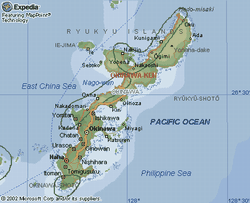Move Will Keep The Controversial Base On The Island
 The United States and Japan agreed
Thursday to relocate a controversial U.S. air base to a less
densely populated area on the Japanese island of Okinawa.
The United States and Japan agreed
Thursday to relocate a controversial U.S. air base to a less
densely populated area on the Japanese island of Okinawa.
The future of Marine Corps Air Station Futenma had been a
subject of intense political debate in Japan that led to the
possibility of the base being moved off the island entirely,
despite a 2006 agreement to relocate it on Okinawa. Talks between
Secretary of State Hillary Rodham Clinton and Defense Secretary
Robert M. Gates for the United States and Foreign Minister Katsuya
Okada and Defense Minister Toshimi Kitazawa for Japan addressed a
range of security concerns and yielded substantial agreement,
officials said.
For years, Okinawans have said they carry the majority of the
burden of hosting American forces in Japan, and the agreement vows
"to reduce the impact on local communities, including in Okinawa,
thereby preserving a sustainable U.S. military presence in Japan,"
according to a joint statement issued by the security and
consultative committee. "The [committee] members expressed their
shared commitments to relocate Marine Corps Air Station Futenma and
return the base to Japan as part of the alliance transformation and
realignment process," the statement said.
 Other realignment initiatives --
including the relocation of about 8,000 Marines and 9,000 family
members from Okinawa to Guam -- depend on completion of the Futenma
replacement facility. The relocation to Guam will return of most of
the U.S. facilities south of Kadena Air Base to Japan. "Bearing
this in mind, the two sides intend to verify and validate that this
Futenma relocation plan appropriately considers factors such as
safety, operational requirements, noise impact, environmental
concerns and effects on the local community," according to the
statement.
Other realignment initiatives --
including the relocation of about 8,000 Marines and 9,000 family
members from Okinawa to Guam -- depend on completion of the Futenma
replacement facility. The relocation to Guam will return of most of
the U.S. facilities south of Kadena Air Base to Japan. "Bearing
this in mind, the two sides intend to verify and validate that this
Futenma relocation plan appropriately considers factors such as
safety, operational requirements, noise impact, environmental
concerns and effects on the local community," according to the
statement.
The agreement confirms that the replacement facility will be at
the Camp Schwab Henoko-saki area and adjacent waters. The ministers
put an end-of-August deadline for completion of a study of the
replacement facility's location, configuration and construction
method. Verification and validation will be completed by the time
of the next security consultative conference, officials said. The
committee also looked at ways to mitigate the burden that Okinawans
bear. The two sides committed to expand the relocation of U.S.
forces training activities off the island. Japanese military
facilities and areas in mainland Japan may also be used. "Both
sides also committed to examine the relocation of training outside
of Japan, such as to Guam," the statement said.
 The committee's statement
recognizes that the alliance remains indispensable not only to the
defense of Japan, but also to the peace, security, and prosperity
of the Asia-Pacific region. The talks were conducted in the shadow
of North Korea sinking a South Korean warship in March. The
tensions in the region have increased, officials noted, and also
reaffirmed the need for the Mutual Security and Cooperation Treaty
between the United States and Japan. In light of the uncertainty of
the situation in Korea, the talks reaffirmed the U.S. commitment to
Japan's security. "Japan reconfirmed its commitment to playing a
positive role in contributing to the peace and stability of the
region," the statement said. "Furthermore, the [committee] members
recognized that a robust forward presence of U.S. military forces
in Japan, including in Okinawa, provides the deterrence and
capabilities necessary for the defense of Japan and for the
maintenance of regional stability."
The committee's statement
recognizes that the alliance remains indispensable not only to the
defense of Japan, but also to the peace, security, and prosperity
of the Asia-Pacific region. The talks were conducted in the shadow
of North Korea sinking a South Korean warship in March. The
tensions in the region have increased, officials noted, and also
reaffirmed the need for the Mutual Security and Cooperation Treaty
between the United States and Japan. In light of the uncertainty of
the situation in Korea, the talks reaffirmed the U.S. commitment to
Japan's security. "Japan reconfirmed its commitment to playing a
positive role in contributing to the peace and stability of the
region," the statement said. "Furthermore, the [committee] members
recognized that a robust forward presence of U.S. military forces
in Japan, including in Okinawa, provides the deterrence and
capabilities necessary for the defense of Japan and for the
maintenance of regional stability."
The ministers also pledged a "Green Alliance" between the
nations on bases, and said both nations would be good environmental
stewards. The two sides intend to study opportunities to expand the
shared use of facilities between U.S. and Japanese forces, which
would contribute to closer bilateral operational coordination,
improved interoperability and stronger relations with local
communities, officials said.
The ministers also affirmed their intention "to intensify
communication with communities in Okinawa on issues of concern
related to the presence of U.S. forces." The two sides committed to
explore cooperation in such areas as information technology
initiatives, cultural exchanges, education programs and research
partnerships. Finally, the ministers agreed to intensify their
ongoing bilateral security dialogue. "This security dialogue will
address traditional security threats, as well as focus on new areas
for cooperation," the statement said.
 Classic Aero-TV: Pure Aerial Precision - The Snowbirds at AirVenture 2016
Classic Aero-TV: Pure Aerial Precision - The Snowbirds at AirVenture 2016 NTSB Final Report: Costruzioni Aeronautiche Tecna P2012 Traveller
NTSB Final Report: Costruzioni Aeronautiche Tecna P2012 Traveller ANN's Daily Aero-Linx (11.23.25)
ANN's Daily Aero-Linx (11.23.25) ANN's Daily Aero-Term (11.23.25): Request Full Route Clearance
ANN's Daily Aero-Term (11.23.25): Request Full Route Clearance Aero-News: Quote of the Day (11.23.25)
Aero-News: Quote of the Day (11.23.25)





